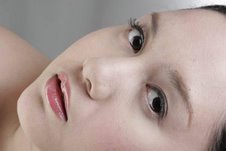Cucumbers soothe skin irritations, prevent water retention and are rich in water, fibre and beneficial minerals. It’s no wonder then that beauty products contain this beneficial vegetable.
So, who has not heard about the wonders cucumber pads can do for tired/over strained eyes? Just cut two slices of cucumber, lie down somewhere comfortable, relax and place the cucumber slices over your eyes. As they work their refreshing magic, in a matter of minutes, you can feel the puffiness and tiredness in your eyes being washed away by the moist cucumber.
If you want happy skin, cucumber is your answer, say beauty experts. As cucumber and the skin share the same level of hydrogen, it becomes easy for cucumber to mask all the problem areas. It helps in soothing and softening your skin so you feel relaxed in no time. Scientifically known as Cucumis sativus, the cucumber belongs to the same family as watermelon, zucchini, pumpkin and other types of squash. Ever wondered how the phrase “cool as a cucumber” originated? Perhaps this is due to cucumber’s high water content (90 per cent) which lends it a unique moist and cooling taste.
Cucumber also contains ascorbic acid (vitamin C) and caffeic acid, both of which soothe skin irritations. These two acid compounds prevent water retention, which is why cucumbers applied topically are helpful for swollen eyes, burns and dermatitis. Its hard skin is rich in fibre and contains a variety of beneficial minerals, including silica, potassium and magnesium. The silica in cucumber is an essential component of healthy connective tissues, which include muscles, tendons, ligaments, cartilage and bone. This is why beauty experts recommend drinking cucumber juice as a source of silica to improve the complexion and health of the skin.
Cucumbers are thought to have originated more than 10,000 years ago in southern Asia. Early explorers introduced this vegetable to India and other parts of Asia, and later to the United States. It was popularly used during the ancient civilisations of Egypt, Greece and Rome, not only as a food source but also for its skin healing properties.
Now that you know how good cucumbers are for you and your skin, besides eating them, you may want to slather some on your skin as well.
Friday, June 29, 2007
SOFT & SMOOTH WITH VITAMIN A
As some of us have learned the hard way, attempting to hide fine lines and wrinkles behind layers of make-up is a losing battle. Far better to improve the condition of your skin itself.
Vitamin A is believed by many to be one of the most important ingredients in any anti-ageing skin care treatment. Also called retinol, it is a fat-soluble vitamin that plays a vital role in your vision, growth, and development.
When applied topically, vitamin A can make a difference in your skin, reducing lines and wrinkles and providing good breakout control. It helps keep skin soft and smooth, while acting as a natural moisturiser. An insufficient supply of vitamin A can lead to dry skin.
Meat and animal-based products are good sources of vitamin A; some fruits and vegetables supply beta-carotene, which the body converts into vitamin A. The best sources of vitamin A are milk, eggs, carrots and spinach.
Vitamin A is believed by many to be one of the most important ingredients in any anti-ageing skin care treatment. Also called retinol, it is a fat-soluble vitamin that plays a vital role in your vision, growth, and development.
When applied topically, vitamin A can make a difference in your skin, reducing lines and wrinkles and providing good breakout control. It helps keep skin soft and smooth, while acting as a natural moisturiser. An insufficient supply of vitamin A can lead to dry skin.
Meat and animal-based products are good sources of vitamin A; some fruits and vegetables supply beta-carotene, which the body converts into vitamin A. The best sources of vitamin A are milk, eggs, carrots and spinach.
BRAIN FUNCTION BOOSTERS
There are many foods which are touted to enhance mental potential. However, it is preferable to select those which are lower in cholesterol.
ANIMAL or fish bones are believed to nourish and strengthen bone since bones are a good source of minerals, especially calcium. In the same vein, herbal soup cooked with animal brain is supposedly good for mental health. Does eating animal brain really improve our memory?
While food will not make one smarter, eating the right type of food helps to increase our mental potential when brain power is lagging.
Brain functions are complex. It is, thus, too simple to single out one particular food as being “best” for memory. For the brain to function efficiently, it requires a greater variety of nutrients than any single food can provide.
What are the foods that are best for boosting brain functions? Basically, eating foods that improve blood circulation and the nervous system helps.
Nutritional goodness of eggs
For breakfast, eating a half-boiled or hard-boiled egg and drinking a cup of milk or soy milk may help to boost brain functions as well as general health. Egg, soybean and, to a lesser extent, milk, contain choline, which is particularly important for brain functions.
Do not skip the egg yolk as it contains choline. While eggs were once considered high in cholesterol as a yolk contains about 200mg of cholesterol, recent studies have shown that eating an egg daily would not significantly affect cholesterol levels, even in those who already have elevated cholesterol levels.
The choline in egg is a nutrient that maintains the flexibility and integrity of brain cell membranes. Without choline, many fat-based nutrients and waste products cannot pass in and out of the cells. Choline is also a key component of acetylcholine, which is a neuro-transmitter that carries messages to and from nerves and muscles.
Choline is a new member of the B vitamin that has been identified in recent years. Our bodies can also produce choline. Inadequate choline levels can cause deficiency of other B vitamins, especially folate, or vitamin B6, which also have a supportive role in mental health.
Eggs, soybeans, peanuts, sesame seeds, potatoes, cauliflower, lentils, oats, butter, flaxseed and liver are common foods that supply choline. Commercially-prepared lecithin (or phosphatidylcholine) is another form of choline extracted from soybean. Lecithin is the most common form of supplemental choline.
Fish and fatty acids
Every cell in the body, including brain cells, is surrounded by a cell membrane composed mainly of fatty acids. The cell membrane allows the proper amounts of necessary nutrients to enter the cell and ensures that wastes are quickly removed.
For our brain cells to work effectively, we need healthy fats that supply fatty acids. Fish often tops the list as brain food. There are vital amino acids and fatty acids in fish that support brain functions.
Within a week, it is best to include fish in at least two meals. If your work or studies require you to burn midnight oil, choose fish for lunch or dinner to ensure your mind can work at its full capacity.
Omega-3 in salmon is one of the fatty acids that is touted to nourish the brain. It maximises the cell’s ability to absorb nutrients while eliminating wastes through the cell membranes. Other than deep-sea fish, foods that supply beneficial fatty acids include walnuts, scallops, shrimps, tuna, soybean, flaxseed and squash.
Furthermore, the amino acids tyrosine, serine and carnitine in fish protein have a key role in keeping us mentally alert and focused.
Plant sources
Do not overlook plants as a source of nutrients for the brain. After studying age-related cognitive change in people above 65 years, scientist Morris M.C. and his team concluded that it is best to eat more vegetables (Neurology, October 2006).
Epidemiological studies have shown those who regularly include turmeric (kunyit) in their diets, such as the elderly Indian population, are less likely to develop Alzheimer's disease. This is believed to be due to curcumin, the pigment that gives turmeric its bright hue.
Regular consumption of nuts and seeds may also help prevent decline in mental functions associated with ageing. Fat-soluble components such as tocopherols and tocotrienols in nuts and seeds are much sought-after nutrients to boost mental health. Palm oil is the only cooking oil rich in vitamin E – therefore, its use is encouraged.
There are numerous plant phytonutrients that provide the immune system with antioxidants as well as improve blood circulation and nervous system function. All these functions are vital for brain activity.
As a guide, vegetables and fruits that are richly coloured – dark green, deep purple, orange or red – are our best choices.
For example, grapes, blueberries, eggplant and purple cabbage – which contain a dark blue to purple pigment called anthocyanin – are regarded as mental health boosters. Broccoli, sawi, kailan, tomatoes, chillies, papayas and the brightly-coloured sweet potato are highly nutrient-dense food which are ideal for health as well as for improving brain functions.
Herbal brain soup
Brain tissue consists mainly of protein, fats and minerals. There is a large amount of cholesterol in fats. More than 800mg of cholesterol is found in 100g of pig brain and 2,000mg in ox brain. These are high cholesterol foods. The recommended daily intake of cholesterol for adults is about 300mg.
Herbal brain soups use herbs of different colours (which may appear dark brown after drying) for flavouring. Whether it is the herbs or the combination of herbs and animal brain that boosts mental health, is yet to be ascertained.
ANIMAL or fish bones are believed to nourish and strengthen bone since bones are a good source of minerals, especially calcium. In the same vein, herbal soup cooked with animal brain is supposedly good for mental health. Does eating animal brain really improve our memory?
While food will not make one smarter, eating the right type of food helps to increase our mental potential when brain power is lagging.
Brain functions are complex. It is, thus, too simple to single out one particular food as being “best” for memory. For the brain to function efficiently, it requires a greater variety of nutrients than any single food can provide.
What are the foods that are best for boosting brain functions? Basically, eating foods that improve blood circulation and the nervous system helps.
Nutritional goodness of eggs
For breakfast, eating a half-boiled or hard-boiled egg and drinking a cup of milk or soy milk may help to boost brain functions as well as general health. Egg, soybean and, to a lesser extent, milk, contain choline, which is particularly important for brain functions.
Do not skip the egg yolk as it contains choline. While eggs were once considered high in cholesterol as a yolk contains about 200mg of cholesterol, recent studies have shown that eating an egg daily would not significantly affect cholesterol levels, even in those who already have elevated cholesterol levels.
The choline in egg is a nutrient that maintains the flexibility and integrity of brain cell membranes. Without choline, many fat-based nutrients and waste products cannot pass in and out of the cells. Choline is also a key component of acetylcholine, which is a neuro-transmitter that carries messages to and from nerves and muscles.
Choline is a new member of the B vitamin that has been identified in recent years. Our bodies can also produce choline. Inadequate choline levels can cause deficiency of other B vitamins, especially folate, or vitamin B6, which also have a supportive role in mental health.
Eggs, soybeans, peanuts, sesame seeds, potatoes, cauliflower, lentils, oats, butter, flaxseed and liver are common foods that supply choline. Commercially-prepared lecithin (or phosphatidylcholine) is another form of choline extracted from soybean. Lecithin is the most common form of supplemental choline.
Fish and fatty acids
Every cell in the body, including brain cells, is surrounded by a cell membrane composed mainly of fatty acids. The cell membrane allows the proper amounts of necessary nutrients to enter the cell and ensures that wastes are quickly removed.
For our brain cells to work effectively, we need healthy fats that supply fatty acids. Fish often tops the list as brain food. There are vital amino acids and fatty acids in fish that support brain functions.
Within a week, it is best to include fish in at least two meals. If your work or studies require you to burn midnight oil, choose fish for lunch or dinner to ensure your mind can work at its full capacity.
Omega-3 in salmon is one of the fatty acids that is touted to nourish the brain. It maximises the cell’s ability to absorb nutrients while eliminating wastes through the cell membranes. Other than deep-sea fish, foods that supply beneficial fatty acids include walnuts, scallops, shrimps, tuna, soybean, flaxseed and squash.
Furthermore, the amino acids tyrosine, serine and carnitine in fish protein have a key role in keeping us mentally alert and focused.
Plant sources
Do not overlook plants as a source of nutrients for the brain. After studying age-related cognitive change in people above 65 years, scientist Morris M.C. and his team concluded that it is best to eat more vegetables (Neurology, October 2006).
Epidemiological studies have shown those who regularly include turmeric (kunyit) in their diets, such as the elderly Indian population, are less likely to develop Alzheimer's disease. This is believed to be due to curcumin, the pigment that gives turmeric its bright hue.
Regular consumption of nuts and seeds may also help prevent decline in mental functions associated with ageing. Fat-soluble components such as tocopherols and tocotrienols in nuts and seeds are much sought-after nutrients to boost mental health. Palm oil is the only cooking oil rich in vitamin E – therefore, its use is encouraged.
There are numerous plant phytonutrients that provide the immune system with antioxidants as well as improve blood circulation and nervous system function. All these functions are vital for brain activity.
As a guide, vegetables and fruits that are richly coloured – dark green, deep purple, orange or red – are our best choices.
For example, grapes, blueberries, eggplant and purple cabbage – which contain a dark blue to purple pigment called anthocyanin – are regarded as mental health boosters. Broccoli, sawi, kailan, tomatoes, chillies, papayas and the brightly-coloured sweet potato are highly nutrient-dense food which are ideal for health as well as for improving brain functions.
Herbal brain soup
Brain tissue consists mainly of protein, fats and minerals. There is a large amount of cholesterol in fats. More than 800mg of cholesterol is found in 100g of pig brain and 2,000mg in ox brain. These are high cholesterol foods. The recommended daily intake of cholesterol for adults is about 300mg.
Herbal brain soups use herbs of different colours (which may appear dark brown after drying) for flavouring. Whether it is the herbs or the combination of herbs and animal brain that boosts mental health, is yet to be ascertained.
Thursday, June 28, 2007
BABIES AFFECTED BY SMOKING
WOMEN who smoke while pregnant may cause permanent cardiovascular damage to their child that could heighten the offspring’s risk for a stroke and heart attack, researchers said.
Doctors long have known about health dangers for babies whose mothers smoked while pregnant, but the new Dutch study showed that these children as young adults tended to have thicker walls of the carotid arteries in the neck.
This thickness can be used to determine a person’s level of atherosclerosis, the process in which deposits build up in the inner lining of an artery, increasing the likelihood of stroke and heart attack.
“There are still substantial numbers of mothers who smoke during pregnancy,” said Dr Cuno Uiterwaal at the University Medical Center Utrecht. “This is just another reason for expectant mothers not to smoke.”
Uiterwaal’s team examined 732 people who were born from 1970 to 1973. They found that the children of the 215 women who had smoked while pregnant had thicker walls of the carotid arteries than children whose mothers did not smoke during pregnancy.
The people whose mothers had smoked the greatest number of cigarettes while pregnant had thicker arterial walls than those whose mothers smoked fewer cigarettes, they found.
“There is the possibility that the compounds in tobacco smoke go through the placenta and directly damage the cardiovascular system of the fetus,” Uiterwaal said in a statement.
“The damage appears to be permanent and stays with the children.”
Doctors long have known about health dangers for babies whose mothers smoked while pregnant, but the new Dutch study showed that these children as young adults tended to have thicker walls of the carotid arteries in the neck.
This thickness can be used to determine a person’s level of atherosclerosis, the process in which deposits build up in the inner lining of an artery, increasing the likelihood of stroke and heart attack.
“There are still substantial numbers of mothers who smoke during pregnancy,” said Dr Cuno Uiterwaal at the University Medical Center Utrecht. “This is just another reason for expectant mothers not to smoke.”
Uiterwaal’s team examined 732 people who were born from 1970 to 1973. They found that the children of the 215 women who had smoked while pregnant had thicker walls of the carotid arteries than children whose mothers did not smoke during pregnancy.
The people whose mothers had smoked the greatest number of cigarettes while pregnant had thicker arterial walls than those whose mothers smoked fewer cigarettes, they found.
“There is the possibility that the compounds in tobacco smoke go through the placenta and directly damage the cardiovascular system of the fetus,” Uiterwaal said in a statement.
“The damage appears to be permanent and stays with the children.”
TIPS ABOUT ACNE PROBLEMS
One of the best things about being a grown-up is waving goodbye to those awkward years of adolescence. But there’s one thing we may not leave behind once we hit twenty one – acne.
Acne – blackheads, whiteheads and pimples – hits many grown-ups at some point in their lives, plaguing about 40% of women and 25% of men.
Acne is triggered when the ducts connecting the sebaceous glands in the skin that dispenses oil to keep skin soft and healthy are abnormally overactive. Excess of oil (sebum) and cells build up in the duct to clog pores with a firm, oil-soaked plug, creating an environment where bacteria and yeasts can thrive. The body’s immune system respond, inflaming the area.
There are many factors that can aggravate adult acne such as stress, inappropriate cosmetic items, medications and genetics, though it is widely accepted by most experts that hormones play a major role. Contrary to popular belief, acne is not caused by eating too many fast food hamburgers with French fries, consuming soft drinks, gorging on chocolate, thinking about sex or not washing your face.
In adult acne, it is linked to hormonal imbalance, which is why grown men are less likely to suffer from it compared to women. In females, hormones go through peaks and troughs more frequently, brought on by changes in their cyclical physiology. The key to unlock how adult acne affects you is to understand the role of androgenic hormones, a class of masculine steroid hormones, and how it affects the skin.
There are various androgenic hormones such as testosterone – developed in the testes in men and ovaries in women as well as the adrenal glands of both sexes – that prompt the production of the oily substance linked to acne. “Flare-ups” can take place whenever the ratio of male-to-female hormones (androgens vs oestrogen) in the body changes, where there is an androgenic overdrive, ie more androgens than oestrogens. This often ensues during adolescence, ovulation, menstruation, and childbirth, which also explains why acne is also common in women who experiencing menopause.
During a menstrual cycle, the hormonal balanced is tipped off balance when the ovaries release the egg, causing the oestrogen levels to drop, or just before a menstrual flow, where progesterone, which has qualities of androgens, rises. Progesterone is made in the adrenal glands and is essential for preparing as well as maintaining the uterine lining for a successful pregnancy, which leads to breakouts for many pregnant women during their first trimester.
Besides testosterone and progesterone, physical strain such as chronic severe sleep deprivation; binge dieting or gorging on junk food can activate stress related hormones that may also instigate acne.
There is supporting evidence that indicates physical ‘tension’ can stimulate the production of corticotrophin, which sends the sebaceous glands that produce the sebum into a frenzy. This is in line with research published in 2002 and highlighted on CNN, which points to stress messing with hormones. Stress stimulates the production of extra progesterone to help cope with the strain, where its androgen component can trigger acne. Men are not immune to stress and do experience ‘flare ups’. However, their bodies create high levels of testosterone throughout their lives, keeping their sebaceous glands at maximum stimulation. This is why extra surges of hormone production in adult males have less affect on their acne when compared to women.
However, the good news is that adult acne is easily controllable via a healthy skin regime which can prevent it from becoming severe and disfiguring.
Be gentle to your skin
The first most important thing for an acne-prone skin is hygiene. It should include no harsh scrubbing or over-washing, because this can cause possible skin irritation or over-production of oil to replace what has been washed off, clogging pores in the process. Products with gentle exfoliation ingredient should be used so as not to irritate the skin. Also skip products containing alcohol where possible as these can take off the top layer of the skin and cause the glands to produce more oil, further causing blocking of pores.
If you do spot acne-troubled areas, do not pick at them. This can aggravate the risk of skin infection and acne scars. In terms of make-up, use a light skin moisturiser and oil-free makeup.
Should acne suddenly start breaking out after having clear skin for years and over-the-counter acne fighters don’t do the job, seek help from your family doctor or a dermatologist. This is because a dermatologist can help tease out the possible cause, and more importantly, find the treatment, or combination of treatments, that works best for your skin type.
There are a range of treatment solutions for mild to moderate acne, ranging from antibiotics, physical treatments and even birth control medications that a dermatologist may recommend.
Most commonly used and usually form the first line of defence to tackle adult acne are retinoids, which are related chemically to vitamin A and are used in medicine to increase skin cell turnover.
Touted to be the most effective type of medications for unblocking the pores of oil glands, they are generally ideal for non-inflammatory acne – whiteheads and blackheads – before they transform into red angry pimples.
Established topical retinoids such as adapalene gel form the latest arsenal of prescription acne fighters to help skin cells shed normally and squeeze out plugged material in the follicle, rather than allowing them to accumulate in pores. Depending on the patient, the newer range of retinoids can be used in combination with antibiotics and have shown considerably less side effects such as dryness, irritation as well as redness which plagued the older generation of vitamin A creams.
In more serious cases severe acne is characterised by deep cysts, inflammation, extensive damage to the skin and scarring, where systemic treatment by a dermatologist is a necessity.
If not treated properly, acne can leave angry and ugly scars in its wake, which will mark a person for life. Here, patients can turn to acne surgery, oral isotretinoin and hormone-modulating agents like contraceptives. Acne surgery serves to drain and extract large cysts that do not respond to medication. It should be done by medical professionals so as not to cause infection and scarring. Isotretinoin is a potent drug containing vitamin A derivative that has shown to be effective on cystic acne and is consumed orally.
Clear skin is possible for even the most acne prone adult. All it takes is getting the right advice, manage your skin prudently and in time it will heal.
More Tips .... surf this
Acne – blackheads, whiteheads and pimples – hits many grown-ups at some point in their lives, plaguing about 40% of women and 25% of men.
Acne is triggered when the ducts connecting the sebaceous glands in the skin that dispenses oil to keep skin soft and healthy are abnormally overactive. Excess of oil (sebum) and cells build up in the duct to clog pores with a firm, oil-soaked plug, creating an environment where bacteria and yeasts can thrive. The body’s immune system respond, inflaming the area.
There are many factors that can aggravate adult acne such as stress, inappropriate cosmetic items, medications and genetics, though it is widely accepted by most experts that hormones play a major role. Contrary to popular belief, acne is not caused by eating too many fast food hamburgers with French fries, consuming soft drinks, gorging on chocolate, thinking about sex or not washing your face.
In adult acne, it is linked to hormonal imbalance, which is why grown men are less likely to suffer from it compared to women. In females, hormones go through peaks and troughs more frequently, brought on by changes in their cyclical physiology. The key to unlock how adult acne affects you is to understand the role of androgenic hormones, a class of masculine steroid hormones, and how it affects the skin.
There are various androgenic hormones such as testosterone – developed in the testes in men and ovaries in women as well as the adrenal glands of both sexes – that prompt the production of the oily substance linked to acne. “Flare-ups” can take place whenever the ratio of male-to-female hormones (androgens vs oestrogen) in the body changes, where there is an androgenic overdrive, ie more androgens than oestrogens. This often ensues during adolescence, ovulation, menstruation, and childbirth, which also explains why acne is also common in women who experiencing menopause.
During a menstrual cycle, the hormonal balanced is tipped off balance when the ovaries release the egg, causing the oestrogen levels to drop, or just before a menstrual flow, where progesterone, which has qualities of androgens, rises. Progesterone is made in the adrenal glands and is essential for preparing as well as maintaining the uterine lining for a successful pregnancy, which leads to breakouts for many pregnant women during their first trimester.
Besides testosterone and progesterone, physical strain such as chronic severe sleep deprivation; binge dieting or gorging on junk food can activate stress related hormones that may also instigate acne.
There is supporting evidence that indicates physical ‘tension’ can stimulate the production of corticotrophin, which sends the sebaceous glands that produce the sebum into a frenzy. This is in line with research published in 2002 and highlighted on CNN, which points to stress messing with hormones. Stress stimulates the production of extra progesterone to help cope with the strain, where its androgen component can trigger acne. Men are not immune to stress and do experience ‘flare ups’. However, their bodies create high levels of testosterone throughout their lives, keeping their sebaceous glands at maximum stimulation. This is why extra surges of hormone production in adult males have less affect on their acne when compared to women.
However, the good news is that adult acne is easily controllable via a healthy skin regime which can prevent it from becoming severe and disfiguring.
Be gentle to your skin
The first most important thing for an acne-prone skin is hygiene. It should include no harsh scrubbing or over-washing, because this can cause possible skin irritation or over-production of oil to replace what has been washed off, clogging pores in the process. Products with gentle exfoliation ingredient should be used so as not to irritate the skin. Also skip products containing alcohol where possible as these can take off the top layer of the skin and cause the glands to produce more oil, further causing blocking of pores.
If you do spot acne-troubled areas, do not pick at them. This can aggravate the risk of skin infection and acne scars. In terms of make-up, use a light skin moisturiser and oil-free makeup.
Should acne suddenly start breaking out after having clear skin for years and over-the-counter acne fighters don’t do the job, seek help from your family doctor or a dermatologist. This is because a dermatologist can help tease out the possible cause, and more importantly, find the treatment, or combination of treatments, that works best for your skin type.
There are a range of treatment solutions for mild to moderate acne, ranging from antibiotics, physical treatments and even birth control medications that a dermatologist may recommend.
Most commonly used and usually form the first line of defence to tackle adult acne are retinoids, which are related chemically to vitamin A and are used in medicine to increase skin cell turnover.
Touted to be the most effective type of medications for unblocking the pores of oil glands, they are generally ideal for non-inflammatory acne – whiteheads and blackheads – before they transform into red angry pimples.
Established topical retinoids such as adapalene gel form the latest arsenal of prescription acne fighters to help skin cells shed normally and squeeze out plugged material in the follicle, rather than allowing them to accumulate in pores. Depending on the patient, the newer range of retinoids can be used in combination with antibiotics and have shown considerably less side effects such as dryness, irritation as well as redness which plagued the older generation of vitamin A creams.
In more serious cases severe acne is characterised by deep cysts, inflammation, extensive damage to the skin and scarring, where systemic treatment by a dermatologist is a necessity.
If not treated properly, acne can leave angry and ugly scars in its wake, which will mark a person for life. Here, patients can turn to acne surgery, oral isotretinoin and hormone-modulating agents like contraceptives. Acne surgery serves to drain and extract large cysts that do not respond to medication. It should be done by medical professionals so as not to cause infection and scarring. Isotretinoin is a potent drug containing vitamin A derivative that has shown to be effective on cystic acne and is consumed orally.
Clear skin is possible for even the most acne prone adult. All it takes is getting the right advice, manage your skin prudently and in time it will heal.
More Tips .... surf this
HEALTHIER COOKING
How your food is prepared affects your health.
By steaming, boiling and stewing foods and using acidic marinades on meat cooked with dry heat, people may be able to stay healthier, a New York City researcher suggests.
These strategies will reduce the amount of advanced gycation end products (AGEs), or glycotoxins that people consume with their food, says Dr Helen Vlassara of Mt Sinai School of Medicine.
With her colleagues, Vlassara has found that the more AGEs healthy people eat, the greater their levels of inflammation and oxidative stress.
“It is time that we pay more attention to these toxic substances ... because they are extremely abundant in our foods,” Vlassara said.
“They do cause inflammation and they tend to accumulate in the body. Over a long time, the constant low-grade inflammation can lead to organ damage and disease.”
By steaming, boiling and stewing foods and using acidic marinades on meat cooked with dry heat, people may be able to stay healthier, a New York City researcher suggests.
These strategies will reduce the amount of advanced gycation end products (AGEs), or glycotoxins that people consume with their food, says Dr Helen Vlassara of Mt Sinai School of Medicine.
With her colleagues, Vlassara has found that the more AGEs healthy people eat, the greater their levels of inflammation and oxidative stress.
“It is time that we pay more attention to these toxic substances ... because they are extremely abundant in our foods,” Vlassara said.
“They do cause inflammation and they tend to accumulate in the body. Over a long time, the constant low-grade inflammation can lead to organ damage and disease.”
Saturday, June 16, 2007
Mengapa Perlu Minum Banyak Air
Air bukan hanya bermanfaat menghilangkan dahaga, malah air juga menjaga metabolisme tubuh badan. Setiap individu disarankan supaya minum sebanyak 8 gelas atau sekurang kurangnya 2.5 liter air setiap hari air juga membuat kulit nampak segar dan terhindar dari kekeringan. Air penting kepada tubuh badan.......................... (1) Sebagai media yang menghantar vitamin dan nutrisi ke seluruh sel dan organ tubuh. (2)Mengawal suhu badan, pengambilan air yang kurang boleh menyebabkan kerosakan sel saraf. (3) Membantu peredaran oksigen keseluruh sel tubuh. (4) Membantu membuang racun dari dalam tubuh. (5) Membantu memelihara jumlah darah sehinga kita mendapatkan keseimbangan tenaga yg baik. (6) Membantu mempercepatkan penyembuhan penyakit............. Jadi banyakkanlah minum air untuk kesihatan tubuh badan anda ...
Sarang Burung Layang-Layang Untuk Awet Muda
Bagi masyarakat cina,khasiat sarang burung layang-layang telah diakui sejak dahulu lagi.sarang burung mengandungi sehingga 20 jenis,glikopretin iaitu sejenis bahan yang mudah dihadamkan oleh tubuh untuk menghasilkan tenaga dan menjalankan pelbagai fungsi badan.ia amat baik untuk kesihatan membantu pesakit yang lemah dan warga tua,ia merupakan protien larut air yang mudah diserap dan dihadamkan walaupun oleh sistem penghadaman yang lemah.
Subscribe to:
Posts (Atom)


























